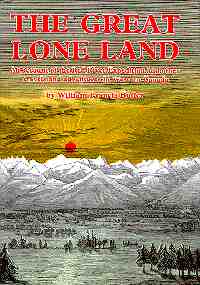Excerpt
from William Francis Butler's The Great Lone Land 
In 1968 Hurtig Publishers reprinted William Francis
Butler's 1872 The Great Lone Land A Narrative of Travel and Adventure
in the North-West of America
Born at Ballyslateen, Suirville, Ireland on October 31, 1838 Sir Wlliam
Butler  was
one of the great soldier-adventurers of the nineteenth century. Overcoming
the handicaps of being an Irishman and a Catholic, he rose in the British
Army to the rank of Lieutenant General. In the process he depended upon
is own drive and imagination to further his ambition. The turning point
in his career came when he brought himself to the attention of Colonel Garnet
Wolseley, who in 1870 headed the much publicized Red River Expedition against
rebellious forces in the Canadian Northwest.
was
one of the great soldier-adventurers of the nineteenth century. Overcoming
the handicaps of being an Irishman and a Catholic, he rose in the British
Army to the rank of Lieutenant General. In the process he depended upon
is own drive and imagination to further his ambition. The turning point
in his career came when he brought himself to the attention of Colonel Garnet
Wolseley, who in 1870 headed the much publicized Red River Expedition against
rebellious forces in the Canadian Northwest.
Butler was assigned by Wolseley to serve as intelligence officer in advance
of the British Army. He successfully completed this rigorous, often dangerous,
mission and then elected to remain in Canada when presented with an offer
of further service. He accepted a commission from the Canadian government
to investigate conditions in the West and to recommend steps leading to
the establishment of law prior to the expected influx of white settlers
among the Indians. Upon completion of the incredible 4,000-mile (6000 km)
trip undertaken on horseback, dogsled, and foot, Butler submitted a report
which is now a classic of Western Canadian history. In it he advocated
the establishment of a well equipped force of men which led to the founding,
of the North West Mounted Police.
These journeys provided Butler with the material for The Great Lone Land,
first published in 1872. In his introduction to the new edition, Edward
McCourt says:
"Butler wrote many books ... but The Great Lone Land has remained
the most popular of all his works. And deservedly so. It is an exciting
tale of adventure; it is a record of prime importance to the student of
western Canadian history; above all it is the revelation of a fascinating,
many-sided personality of an impulsive humanitarian; a passionate individualist;
and a lover of the great western spaces with an eye quick to discern the
patterns and subtle nuances of a prairie landscape, and a pen able to record
things seen and felt and heard in words which often rise to the level of
poetry."
Long acknowledged as an outstanding descriptive writer, Butler's works include
a fascinating autobiography, and his account of his 1873 expedition across
Canada to the Pacific, The Wild North Land.
In addition to his Canadian experiences, Sir William Butler saw military
service in the Sudan and Egypt and was in command of British troops in South
Africa just before the Boer War. His military service ended with his retirement
in 1905. He died at Bansha Castle, Ireland on June 7, 1910.
For more information go to the William
Francis Butler Timeline
Return
to Butler's The Great Lone Land
How do I participate
in the student Sketchbook Project?
Explorers
Sketchbook Series Main Page
 Back to Our Heritage
Home Page
Back to Our Heritage
Home Page